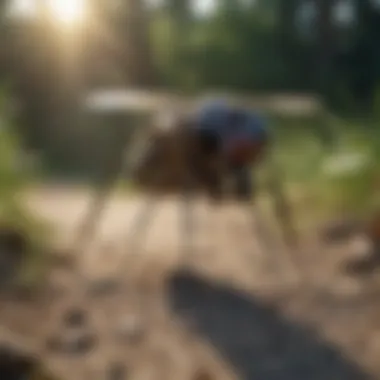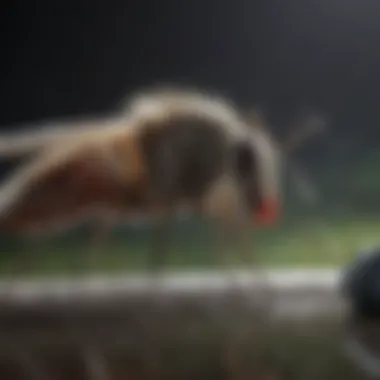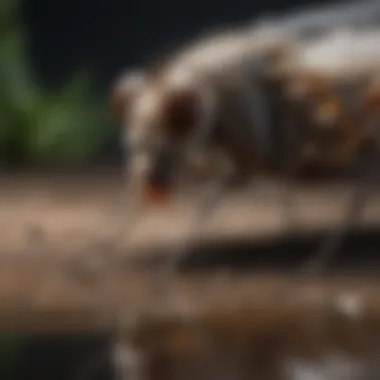Understanding Mosquito Squad Misting System Costs


Intro
Mosquito control is a pressing issue for many households. The annoyance of mosquitoes goes beyond mere discomfort; these pests can carry diseases that pose health risks to family members and pets. As a result, homeowners often seek effective and long-term solutions to manage mosquito populations in their yards. One such solution is the Mosquito Squad misting system, which provides a systematic approach to mosquito control.
Understanding the financial aspects of these systems is crucial. This article presents an in-depth analysis of Mosquito Squad misting system costs, which includes equipment prices, installation fees, maintenance expenses, and a comparison of long-term value. By exploring these factors, homeowners and pest control professionals can make informed decisions on investing in mosquito management.
Additionally, we will discuss alternative pest control methods, giving a well-rounded understanding of options available in the market. This comprehensive approach helps to clarify the significance of mosquito control in maintaining a safe and pleasant outdoor environment.
Understanding the Pest
Identification
Mosquitoes are often mistaken for other flying insects, which can lead to ineffective control strategies. They belong to the family Culicidae, and there are over 3,500 species worldwide. Common types include the Aedes, Culex, and Anopheles mosquitoes. Understanding their specific traits helps in identifying potential breeding grounds and selecting the right control measures.
Life Cycle
Mosquitoes have a complex life cycle that consists of four stages: egg, larva, pupa, and adult. The eggs are typically laid in stagnant water, which serves as a breeding ground. After a few days, larvae emerge, feeding on organic material present in the water.
The larval stage lasts up to two weeks before they transform into pupae. Pupae are non-feeding and undergo metamorphosis, becoming adult mosquitoes within a few days. Understanding this life cycle aids in determining when and how to apply control methods effectively.
Understanding Mosquito Control Needs
Mosquito control is a significant concern for homeowners, especially in areas where these insects are prevalent. The need for effective mosquito management is underscored by the health risks associated with mosquito bites. Mosquitoes are known carriers of diseases like West Nile virus, Zika virus, and malaria. Thus, understanding the importance of mosquito control is essential for anyone looking to improve their home environment.
Control strategies often vary in effectiveness and cost, making it critical for homeowners to evaluate their options carefully. From simple remedies to complex systems like Mosquito Squad's misting solution, each approach has its own pros and cons. Understanding these choices helps homeowners make informed selections aligned with their specific needs and budgets.
Furthermore, recognizing the unique characteristics of one’s property can lead to better prevention strategies. Factors such as yard size, water features, and landscaping play a role in formulation of a mosquito control plan. Misting systems can be particularly effective in large outdoor spaces, where mosquitoes are likely to breed and thrive. Comprehensive knowledge allows individuals to weigh these factors before investing in a system, leading to better outcomes and satisfaction.
The Importance of Mosquito Control
Effective mosquito control contributes greatly to the quality of outdoor living. When mosquitoes are kept at bay, families can enjoy their yards without the annoyance of bites and the fear of disease transmission. This effect is particularly valuable during warm months when outdoor activities are most prevalent.
In addition to improving comfort, mosquito control can enhance property value. Homes with well-maintained yards that are free from pesky insects are more attractive to potential buyers. Therefore, investing in a reliable control method can yield dividends not just in enjoyment but also in property appreciation over time.
Finally, the psychological benefits of effective mosquito management should not be overlooked. Feeling secure in one’s environment, particularly for families with children, adds to the sense of peace in one’s home. This feeling is especially pertinent as concerns about mosquito-borne diseases rise each summer.
Factors Affecting Mosquito Populations
Several factors influence the presence and population density of mosquitoes in a given area. Geographic location plays a key role, as regions with warm and humid climates offer ideal breeding conditions. Consequently, homeowners should anticipate higher mosquito activity during warmer months.
Water sources are another crucial consideration. Stagnant water, such as puddles or poorly maintained bird baths, can provide perfect breeding grounds. Eliminating standing water around one's property is a vital step in maintaining a lower mosquito presence.
Landscaping features can either attract or repel mosquitoes. Overgrown vegetation can create sheltered areas that are favorable for mosquitoes, whereas well-maintained landscaping can discourage their presence. As a result, homeowners should consider both their yard maintenance habits and the specific conditions that invite mosquito populations.
To summarize, understanding mosquito control needs is essential for effective home management. It encompasses health considerations, property value implications, and environmental factors that all play a part in forming a comprehensive strategy for mosquito management. A thoughtful approach to these needs enhances outdoor experiences and promotes healthier living conditions.
Overview of Mosquito Squad Misting Systems


Understanding the significance of Mosquito Squad misting systems is crucial for homeowners, especially those who seek effective solutions for mosquito control. These systems come into play as a preferred method, helping to create a comfortable outdoor environment. They serve not only to repel and kill mosquitoes but also to assist in reducing the risk of diseases associated with these pests, such as West Nile virus or Zika. Homeowners invest in such systems when standard test methods prove insufficient.
Functionality of Misting Systems
Misting systems, specifically the ones designed by Mosquito Squad, operate through a simple yet effective mechanism. They utilize a network of pipes that are strategically placed around a property. Once activated, the system releases a fine mist containing insecticide or other natural solutions into the air. This mist not only reduces the existing mosquito population but also creates a protective barrier against future infestations.
A key benefit is the automation of the system. Homeowners can schedule misting cycles, making it convenient and less time-consuming. This automated approach ensures consistent control, effectively breaking the life cycle of mosquitoes. Moreover, the targeted delivery of the treatment minimizes chemical exposure to people and pets, enhancing safety aspects.
Components of the Misting System
A Mosquito Squad misting system typically consists of several essential components, which together ensure comprehensive mosquito management. The primary elements include:
- Misting Nozzles: These are positioned to create optimal coverage. They spray the mist evenly across the outdoor areas, intercepting mosquitoes as they attempt to enter.
- Pump Unit: The pump draws the insecticide from the tank and sends it through the pipes to the nozzles. The power of the pump is vital for ensuring an even mist distribution.
- Storage Tank: This tank holds the insecticide solution. The capacity of the tank varies, allowing homeowners to select based on their needs.
- Control System: Modern systems often feature an automated control unit. This allows for programming schedules easily, optimizing efficiency and convenience.
Initial Costs of Installation
Understanding the initial costs of installing a Mosquito Squad misting system is crucial for homeowners considering this method of mosquito control. This section outlines the various expenses and factors that contribute to the initial investment. Evaluating these costs can help homeowners make informed decisions that align with their pest management strategies.
Equipment Costs
Equipment costs represent a significant component of the overall installation expenditure. The Mosquito Squad misting system requires specific hardware to function effectively. The primary elements of the system include misting nozzles, spray lines, a storage tank, and a control unit. These components vary in price based on quality and features.
- Misting Nozzles: Quality nozzles ensure even distribution of pesticides. Cheaper options might lead to inconsistent coverage and possibly higher long-term costs due to inefficiency.
- Storage Tank: This holds the pesticide solution. The capacity and material can impact cost. Larger tanks can be more expensive but may require less frequent refills.
- Control Units: Automatic systems allow for programming schedules, which enhances convenience. Investing in advanced control units could increase the total initial costs.
Generally, homeowners can expect these equipment costs to range from $2,500 to $4,500 depending on the size of the area being treated and the specific components chosen.
Labor and Installation Fees
Labor costs should also be factored into the initial expenses. Professional installation is advisable for optimal system performance. A Mosquito Squad technician generally assesses the property before installation, considering layout and specific mosquito problem areas.
- Hourly Rates: Labor fees can vary significantly. Homeowners often pay between $75 to $150 per hour for professional service.
- Installation Duration: Typically, installation takes several hours to a full day, depending on system complexity and property size.
In total, labor and installation fees can add anywhere from $500 to $1,500 to the initial costs.
Additional Setup Considerations
Beyond the direct equipment and labor costs, certain additional factors can affect the overall investment.
- Site Preparation: Some properties may require landscaping modifications to accommodate the system. This could increase costs further.
- Permits: Depending on local regulations and property size, specific permits may be necessary, which can incur extra fees.
- Pest Management Program Options: Homeowners may want to consider ongoing service plans that can include regular maintenance and chemical refills to keep the system effective.
Ongoing Maintenance Costs
Understanding the ongoing maintenance costs is crucial for homeowners considering the Mosquito Squad misting system. Regular upkeep plays a significant role in ensuring the system functions efficiently over its lifespan. Taking a proactive approach to maintenance can save money down the line and enhance the effectiveness of mosquito control.
Routine Maintenance Requirements
Routine maintenance is essential to keep the misting system in optimal working condition. This includes checking the nozzles for blockages, ensuring the hoses are intact, and assessing the overall functionality of the system.


- Inspect nozzles regularly for any obstructions. Blocked nozzles can lead to uneven mosquito distribution and ineffective treatments.
- Examine lines for leaks or damage. Any leaks in the system can lead to wasted chemicals and reduced effectiveness.
- Ensure the pump is operational and free from debris. A malfunctioning pump can prevent proper misting and negatively impact control efforts.
Additionally, scheduling professional inspections at least once a year is advised. These checks help identify potential issues before they escalate into costly repairs. Homeowners may consider a service plan that combines both routine checks and repairs for a comprehensive maintenance approach.
Chemical Refills and Supplies
The chemical usage is a significant part of the ongoing costs associated with the Mosquito Squad misting system. Chemical refills generally depend on the size of the misting system and the level of mosquito activity in the area. Each system typically requires specific insecticides designed for effectiveness and safety.
- Frequency of Refills: Homeowners should plan for refilling chemicals every 2 to 4 weeks during peak mosquito season. This ensures consistent treatment and helps manage the mosquito population effectively.
- Types of Chemicals Needed: Chemicals can vary; therefore, understanding the specific needs of the misting system is important. Options include synthetic and natural insecticides, which should be chosen based on effectiveness, safety, and homeowner preference.
- Cost of Supplies: The cost of these insecticides can add up over time. It is essential to budget for these refills and to know the average pricing based on the required frequency of use.
Regular attention to chemical management is vital to maintain the efficacy of mosquito control efforts. Neglecting chemical refills can result in a resurgence of mosquito populations, undoing previous efforts and automagically increasing long-term costs.
In summary, ongoing maintenance costs for the Mosquito Squad misting system require careful consideration. Homeowners must be prepared for routine maintenance checks, chemical refills, and the strategic management of supplies to maximize the benefits of their investment.
Long-Term Financial Considerations
Understanding the long-term financial implications of investing in a Mosquito Squad misting system is crucial for homeowners. It's not just about the initial outlay. This section breaks down how these systems potentially save money over time while providing an effective mosquito control solution.
Return on Investment Analysis
When considering a Mosquito Squad misting system, it's essential to analyze the return on investment (ROI). Homeowners want to know how long it will take before the upfront cost starts to pay off. Thes systems offer several advantages:
- Reduced Chemical Use: By utilizing a misting system, you decrease the reliance on frequent chemical spraying, which can accumulate significant costs each season.
- Enhanced Property Value: Homes with effective pest control are usually more appealing to buyers, potentially increasing your property's value over time.
- Quality of Life Improvements: The enjoyment of outdoor spaces without the fear of mosquito bites can be seen as a significant return in itself. Families can spend more time outside, which can improve overall wellbeing.
The quantitative aspects can be complex, but many homeowners report positive ROI within 3-5 years, assuming consistent use and regular maintenance of the system.
Comparative Costs with Chemical Spraying
The comparison between a mosquito misting system and traditional chemical spraying methods shows stark differences.
- Upfront Costs: Traditional spraying methods might seem cheaper initially, but the need for repeat treatments increases costs significantly over time.
- Frequency: Chemical spraying may need to be conducted every few weeks during the peak mosquito season, quickly adding up.
- Efficacy: Misting systems deliver long-lasting results, often requiring less frequent maintenance than the chemical alternatives.
Homeowners should weigh these costs against the reduced frequency and amount of chemical required with a misting system. A well-maintained misting system can be more cost-effective in the long run, despite higher initial installation costs.
Cost-Effectiveness Over Time
Evaluating the cost-effectiveness of a Mosquito Squad misting system involves looking beyond mere dollars and cents.
- Longevity of the System: Misting systems typically last several years with proper maintenance. This provides value through extended use, minimizing long-term expenditures.
- Less Environmental Impact: Costs associated with chemical products can also encompass environmental factors, such as local regulations or cleanup efforts. Misting systems reduce these variables.
- Quality Assured: Investing in a reputable misting system ensures consistency in performance, minimizing the risk of infestations that could otherwise incur costs due to damages or repairs.
Alternative Mosquito Control Solutions
Understanding alternative mosquito control solutions is crucial for homeowners looking to balance effectiveness and environmental impact. Traditional chemical treatments, though effective, often raise concerns regarding safety and sustainability. Thus, exploring different approaches to mosquito management becomes essential. This section highlights various methods, focusing on their benefits and considerations that homeowners should take into account.
Comparing Other Systems
There are numerous options available in the market for mosquito control. Different systems cater to varied needs and budgets. Here are some common systems:


- Traditional Spraying: This involves using insecticides sprayed manually or via truck-mounted systems. It's effective but often requires frequent applications and can contaminate water supplies.
- Ultrasonic Devices: These gadgets emit high-frequency sounds aimed at repelling mosquitoes. While they sound promising, studies show inconsistent results regarding their effectiveness.
- Bug Zappers: Electric bug zappers attract and kill mosquitoes using light. However, they often attract other beneficial insects, which can disrupt the local ecosystem.
- In-ground Sprinklers: Some homeowners opt for systems integrated into existing irrigation. While this method is discrete, it may still involve chemical use and might not provide broad area coverage.
Each of these systems has its pros and cons. Homeowners should carefully assess their specific situations—taking account of the size of their properties, local mosquito population dynamics, and personal preferences about chemical usage.
Natural and Eco-Friendly Methods
Eco-friendly methods are gaining traction among homeowners who prefer to avoid chemicals. These alternatives focus on prevention rather than elimination. Some effective techniques include:
- Natural Predators: Encouraging natural predators, such as bats and birds, can help control mosquito populations. Birdhouses and bat boxes can provide homes for these creatures, promoting a balanced local ecosystem.
- Mosquito-Repellent Plants: Some plants naturally repel mosquitoes. Consider incorporating citronella, lavender, or marigolds in your garden. These plants can add beauty while contributing to pest control.
- Biological Controls: Certain products introduce bacteria or other microorganisms that specifically target mosquito larvae. Bacillus thuringiensis israelensis (BTI) is a popular choice in this category, recognized for its effectiveness and low environmental impact.
- Water Management: Since mosquitoes breed in standing water, eliminating sources of stagnant water on your property is crucial. Regularly empty and clean any containers that collect water, such as bird baths, pet dishes, or clogged gutters.
These natural solutions often require more time and effort but align well with a more sustainable approach to pest management.
"Eco-friendly methods are an investment in the environment and can lead to long-term benefits in mosquito control."
Homeowners should weigh these alternatives carefully, considering both their immediate pest management needs and their long-term environmental goals. Awareness of available options empowers buyers, letting them choose systems that align with their values and effectively manage mosquito populations.
Evaluating Individual Needs
When considering a Mosquito Squad Misting System, it's crucial to evaluate individual needs carefully. This evaluation shapes the overall effectiveness and satisfaction derived from the system. Homeowners should focus on specific elements such as property size, landscape features, and personal preferences regarding pest management.
First, understanding property characteristics allows for tailored solutions. Each property differs, influencing how mosquitoes breed and thrive. By analyzing your yard layout, surrounding vegetation, and water features, you can determine the best locations for misting nozzles. This strategic placement maximizes coverage and minimizes mosquito presence.
Another important aspect is assessing the personal pest management preferences. Some homeowners may prefer chemical solutions, while others lean towards more eco-friendly options. Knowing your stance helps in configuring the misting system to suit your lifestyle and values.
A detailed evaluation also ensures that any investment made is justified. It can help in understanding the return on investment and overall satisfaction. By examining both the property needs and personal preferences, you can make informed decisions that comply with financial and practical considerations for mosquito control.
Assessment of Property Characteristics
To effectively manage mosquito issues, assess your property characteristics. Aspects such as the size of your yard, the amount of shade, and the presence of water bodies all contribute to mosquito activity. Larger properties typically require more extensive systems, while smaller ones may only need minimal coverage.
Consider landscape features. Dense shrubs and tall grasses can serve as breeding grounds for mosquitoes, making it essential to incorporate these elements into your assessment. The layout of your property will dictate the configuration of the misting system. Identify areas that generate excessive moisture or are heavily shaded, as these are key locations where mosquitoes thrive.
Take note of surrounding properties as well. If neighboring homes also have vegetation conducive to mosquito breeding, these external factors can affect your mitigation efforts. Regular monitoring and adjustment to your system may be needed to counteract influences from outside your property.
Personal Pest Management Preferences
When it comes to pest control, preferences vary widely among homeowners. Some may prefer aggressive methods, while others seek a balance that includes environmental considerations. Knowing what you want from your pest control system is essential for optimizing its use.
If you are inclined toward chemical treatments, a Mosquito Squad Misting System can be programmed for regular applications, ensuring efficient coverage against pests. Conversely, if you are more eco-conscious, exploring natural alternatives in the misting solution becomes relevant. These can often be integrated into the system without losing effectiveness.
A well-defined strategy aligned with your pest management preferences ensures that you will achieve both relief from mosquitoes and peace of mind regarding the methods used. By understanding your values and needs, you can optimize the misting system for effectiveness and alignment with your ethical standards.
Culmination
In this article, we have thoroughly examined the financial dimensions surrounding the installation of a Mosquito Squad misting system. The conclusion serves as a pivotal point to reflect on key elements discussed throughout. Understanding the comprehensive costs associated with equipment, installation, ongoing maintenance, and long-term financial implications can help homeowners make informed decisions regarding their mosquito control strategies.
Summary of Financial Implications
The financial implications of adopting a Mosquito Squad misting system extend beyond initial installation costs. The remaining expenditures such as maintenance, chemical refills, and the potential for long-term savings play a critical role. Homeowners should consider:
- Initial Costs: These include the price of equipment and labor for installation, which can significantly vary based on the property size and specific system requirements.
- Ongoing Maintenance: Regular maintenance is crucial to ensure system efficiency and longevity. Budgeting for routine checks and chemical refills is necessary for ongoing mosquito control.
- Long-Term Value: By evaluating the return on investment, homeowners may find the misting system not only minimizes expenses related to pest control but also enhances outdoor living experiences without the annoyance of mosquitoes.
By synthesizing information throughout the article, we emphasize that investing in a Mosquito Squad misting system can be both a practical and financially sound decision for effective mosquito management. Understanding costs associated with this investment is essential for achieving satisfaction and effective pest control.







